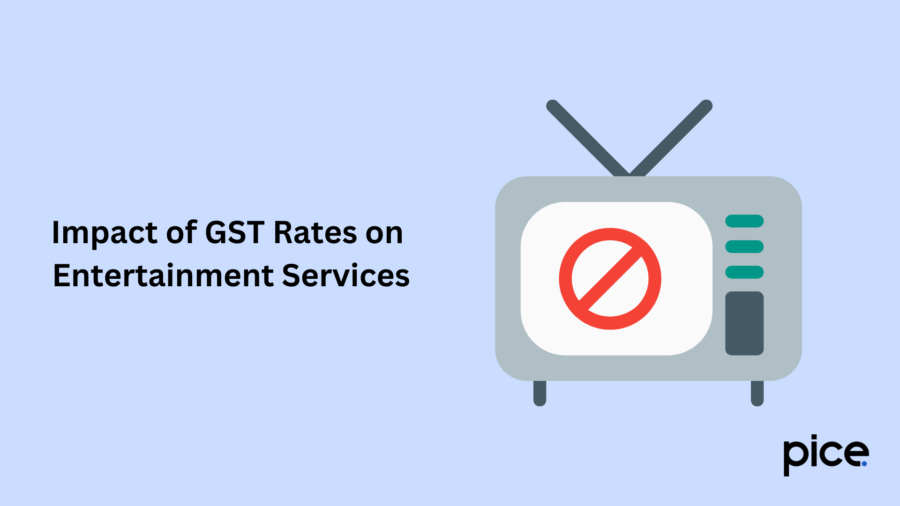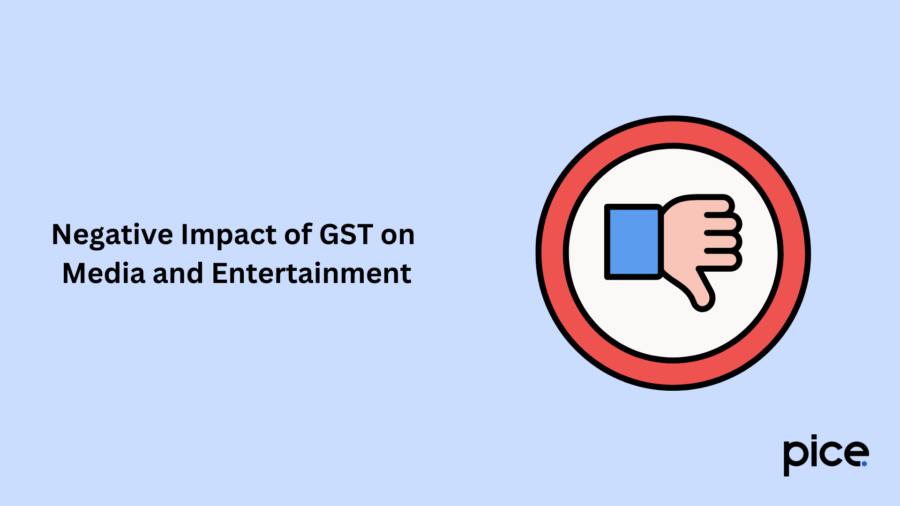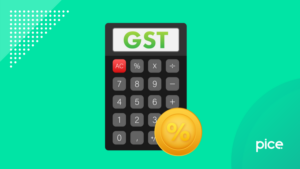Impact of GST on Media and Entertainment Industry
- 13 Feb 25
- 11 mins

Impact of GST on Media and Entertainment Industry
Key Takeaways
- GST replaced Entertainment Tax, with rates between 18%-28%.
- States levy extra taxes, increasing costs in some regions.
- Consumers face mixed impacts, with costs rising in low-tax states.
- ITC benefits industry owners, reducing some operational costs.
- Local body taxes add burden, affecting profits and ticket prices.
The entertainment industry extends across a diverse range of sectors and is a big part of the average person's life. Most individuals spend their weekends going out, attending movies, and enthusiastically cheering at game stadiums, among other activities.
We shall discuss the applicability and impact of GST on the media and entertainment industry as well as trace its implications experienced by both the entertainment industry runners and end consumers.
Refer to this blog for all updated informational bits regarding the imposition of GST on the entertainment industry.
Entertainment Tax in India

In this section, we shall get into when the tax on entertainment services was introduced in our country in the pre-GST regime or VAT regime. The concept was introduced in the year 1948 for the first time, when the British government was still in rule.
Currently, the rate of tax on entertainment is 30% in India, across most of its regions. The taxes on entertainment are chargeable on gaming, restaurant services, enjoying folk dance, sports events, and movie tickets, as well as on gambling, among others.
The GST rate applicable on movie tickets is 28% at present. On the other hand, the rate of GST applicable on gaming/gambling activities sits at 18%.
The entertainment tax is imposed by the state government. GST, however, is levied upon by the central government.
The revenue that accumulates upon collection of entertainment taxes is utilised for the further development of the film industry in general. This entertainment tax serves as a significant source of income for the government while boosting the growth of the showbiz sector.
Features of the Entertainment Tax in India
The entertainment tax shall be a part of the tickets that moviegoers pay for, the food they buy and other related expenses. Explore some of the basic features of the entertainment tax levied in India:
- The entertainment tax was introduced when the British Raj was in session within India. The entry of the entertainment tax was a measure towards curbing public crowd gatherings. It continued to be chargeable in various aspects of the entertainment industry.
- The entertainment tax rate varies in applicability from one state to another and among different Union Territories.
- State governments reserve the authority to collect the entertainment tax from entertainment consumers who benefit from the supply of services.
- Article 246 of the Indian constitution mentions all the rules and guidelines, which apply to the entertainment tax system in our country.
- Entertainment tax is levied upon the entire supply of entertainment or amusement activities. This includes payments made for entertainment events like visiting the exhibition of cinema and buying drinks at movie theatres, watching sports and games take place live, socialising at recreation clubs, playing at arcades, watching celebrity-led stage shows, and other spots hosting entertainment gigs.
- The entertainment tax is calculated, resulting as a percentage of the value of the bought or the gross receipt generated through a transaction.
- Television, streaming and online supply of entertainment services that an individual has to pay for to avail, attract additional tax obligations.
- An entertainment tax is chargeable to both the organizers and the consumers across certain states. On the other hand, the entertainment tax is levied only upon the organizers of entertainment gigs.
- There is a maximum limit set on the amount of tax chargeable per ticket, in some states.
- Entertainment tax may not be levied at all if the total value of the ticket does not go above a set threshold limit, in certain states.
- Entertainment tax may not be chargeable on activities that are supported by an educational or religious motto.
- Complimentary tickets are not associated with the applicability of an entertainment tax.
Entertainment Tax Under GST
Refer to the table below for a clear understanding of the state-wise break-up of total tax applicable across various entertainment activities in India:
| State Name | Total Tax Incidence (in %) |
| Assam | 15 |
| Bihar | 50 |
| Maharashtra | 45 |
| Tamil Nadu | 15 (Tax is not chargeable on Tamil Films) |
| Odisha | 25 |
| Kerala | 30 |
| Delhi | 20 |
| Jharkhand | 20 |
| Madhya Pradesh | 40 |
The Goods and Services Tax (GST) was introduced in July 2017. It brought forth a simplified tax system, revolutionising the tax collection process in our country. GST is an indirect tax levied upon various goods and taxes, replacing a multitude of complex indirect taxes. The entertainment tax since then, has been subsumed into GST.
As a result, entertainment tax is no longer separately chargeable in India. However, it is important to note that certain states do still levy other taxes in addition to the GST, which are popularly referred to as ‘entertainment tax’. Such states include Maharashtra, Odisha, Tamil Nadu, Assam, Bihar, Kerala, West Bengal, Madhya Pradesh and Telangana.
The applicable GST rate upon entertainment activities is 18%. This percentage is comparatively higher than the earlier tax rate of 15-20% in effect. Due to this change, the tax burden on the entertainment sector has risen. It has, in turn, led to an increase in prices of ticket prices for movies and other entertainment activities.
States charge an extra tax in addition to the GST amount, which shall range between 20 - 30%. Therefore, the total resulting tax applicable on participation in entertainment across such states ranges between 38-48% (i.e. GST + Additional Tax). The percentage is one of the highest tax rates of any sector in the country.
However, the additional tax rates applicable are not the same across different states. For instance, the tax rate on movie tickets is 28% in Maharashtra and 30% in Tamil Nadu. While the tax rate on theatre tickets in Kerala is 20%, it is 25% in Madhya Pradesh. Thus, the rate depends from region to region.
Impact of GST Rates on Entertainment Services

Here is a table demonstrating the final GST rates, which are applicable to the entertainment industry after July 2017 (upon implementation of the new and improved tax structure):
| Type of Entertainment | GST Rate Applicable |
| Circus | 18% |
| Theatre | 18% |
| Drama | 18% |
| Indian Classical Performance (includes fold dance) | 18% |
| Exhibition of Movies | 28% |
| Cinema Exhibition Service | 28% |
| Race | 28% |
| Casinos | 28% |
| Sporting Events | 28% |
| Amusement Parks | 28% |
There has been a noteworthy impact on both entertainment sector owners/runners as well as entertainment consumers. In the following sections, we shall trace the impact on both parties.
Impact of GST on End Consumers
To understand the impact of GST on end consumers, we shall cite a fitting example. Setting the scene at movie theaters, movie festivals, and multiplexes, we will move forward. There are usually the typical expenses of food and beverages taxed at a VAT of 20.5%. An approximate 30% tax is chargeable on the tickets, depending on which state one is in.
Film tickets are associated with a GST rate of 28%. Since food and drink options are categorised under the supply of food/beverages in outdoor catering, an additional 18% GST is applicable.
With this example, we can conclude that GST rates associated with the entertainment industry are indeed, lower than the VAT/Service Tax from the end consumers’ perspective. Yet, it is important to note that GST rates may have mixed effects upon the entertainment industry, depending from state to state.
For instance, in states which have a higher entertainment tax, GST will be beneficial. It will lead to a reduction in the prices for end customers. But GST may have a negative effect on certain states which may have already had a lower entertainment tax rate.
For a better understanding of the impact of GST on end consumers (watching movies at the cinema hall, in this case), we have listed below the examples of two states.
In Punjab (0% Entertainment Tax):
| Before GST | After GST | |
| Ticket Price | 300 | 300 |
| Tax | 0 | 84 |
| Total Price for Ticket | 300 | 384 |
| Popcorn + Corn Combo | 150 | 150 |
| Tax Applicable on the Above | 36 | 27 |
| Total Price of F & B | 186 | 177 |
| Total Payment | 486 | 561 (Burden of taxes increases) |
In Uttar Pradesh (60% Entertainment Tax):
| Before GST | After GST | |
| Ticket Price | 300 | 300 |
| Tax | 180 | 84 |
| Total Price for Ticket | 480 | 384 |
| Popcorn + Corn Combo | 150 | 150 |
| Tax Applicable on the Above | 36 | 27 |
| Total Price of F & B | 186 | 177 |
| Total Payment | 666 | 561 (burden on consumers decreases) |
By skimming through the above-mentioned examples of states, the difference in final rates post-implementation of GST reflects a negative and positive impact respectively.
Impact of GST on Entertainment Industry Owners
The entertainment industry owners and runners also experience various degrees of impact through the implementation of GST in India. There may be either a positive or a negative impact, based on the state one is based out of.
Here are some features that the entertainment industry owners are able to avail:
- Input Tax Credit (ITC) Availability: ITC is available on the various service components, including activities like renting movie hall premises, catering and security-related costs that were not available in the previously existing tax regime. Thus, industry owners shall claim input GST paid when renting out a premise and have it adjusted with the output GST earned from ticket sale.
- Added Tax by Municipalities: Even though municipal bodies have not had any share in the collection of entertainment taxes levied by states, there have been reports that some states are gearing up to request local bodies to levy E. tax. These states include Rajasthan, Madhya Pradesh, and Gujarat. If or when the local taxes are enforced, the operating margins/profits shall be affected simultaneously.
Negative Impact of GST on Media and Entertainment

While the implementation of GST is beneficial to states that previously had higher entertainment tax rates associated, the impact can prove to be negative on other states (with low E. tax).
On top of the GST rate, local bodies in a few states (like Maharashtra) may charge an LBET (Local Bodies Entertainment Tax) ranging between 10% to 25% on cinemas, cable DTH services and TV. Such additional taxes charged by local bodies do seem like an added obligation, sort of like a back-handed entertainment tax. If such taxes are continued to be charged by respective local authorities, there would inevitably result in a decrease in the operating margins/profits for the industry.
This would lead to a boost in the cost that consumers are to bear. Keeping the negative impact of such nature in mind, it is safe to say that the entertainment industry has had a mixed experience under the new regime. Both positive as well as negative impacts of GST have been felt by the entertainment industry (varies from state to state).
Regional films that were exempted from tax costs before have been negatively affected by the GTS regime.
Conclusion
We can conclude that the impact of GST on the entertainment industry may be positive or negative, based on which state the consumer/owner resides in. Movie hall owners, park directors and others mainly gain under the GST era, primarily owing to the provision of input tax credit.
On the other hand, the impact of GST on the entertainment industry shall be felt negatively owing to the additional local taxes, if charged across certain states.
💡If you want to streamline your payment and make GST payments via credit card, consider using the PICE App. Explore the PICE App today and take your business to new heights.
FAQs
 By
By 














